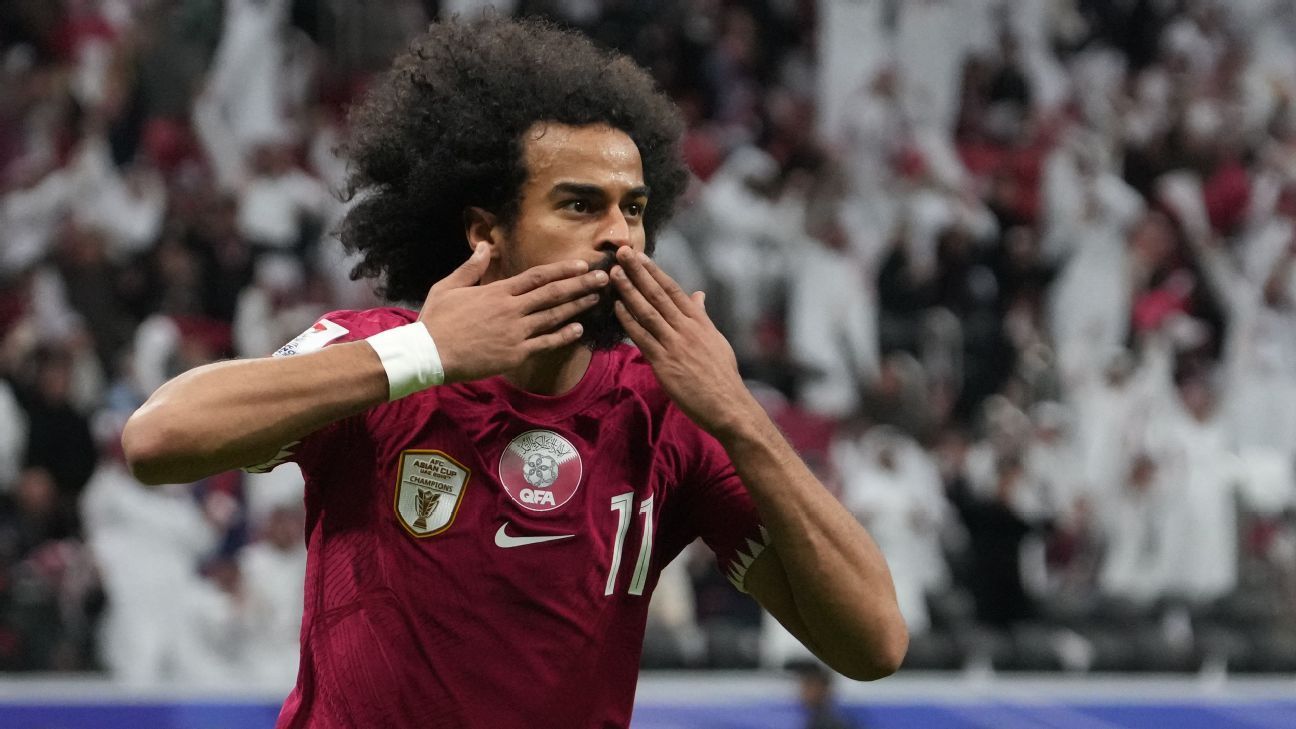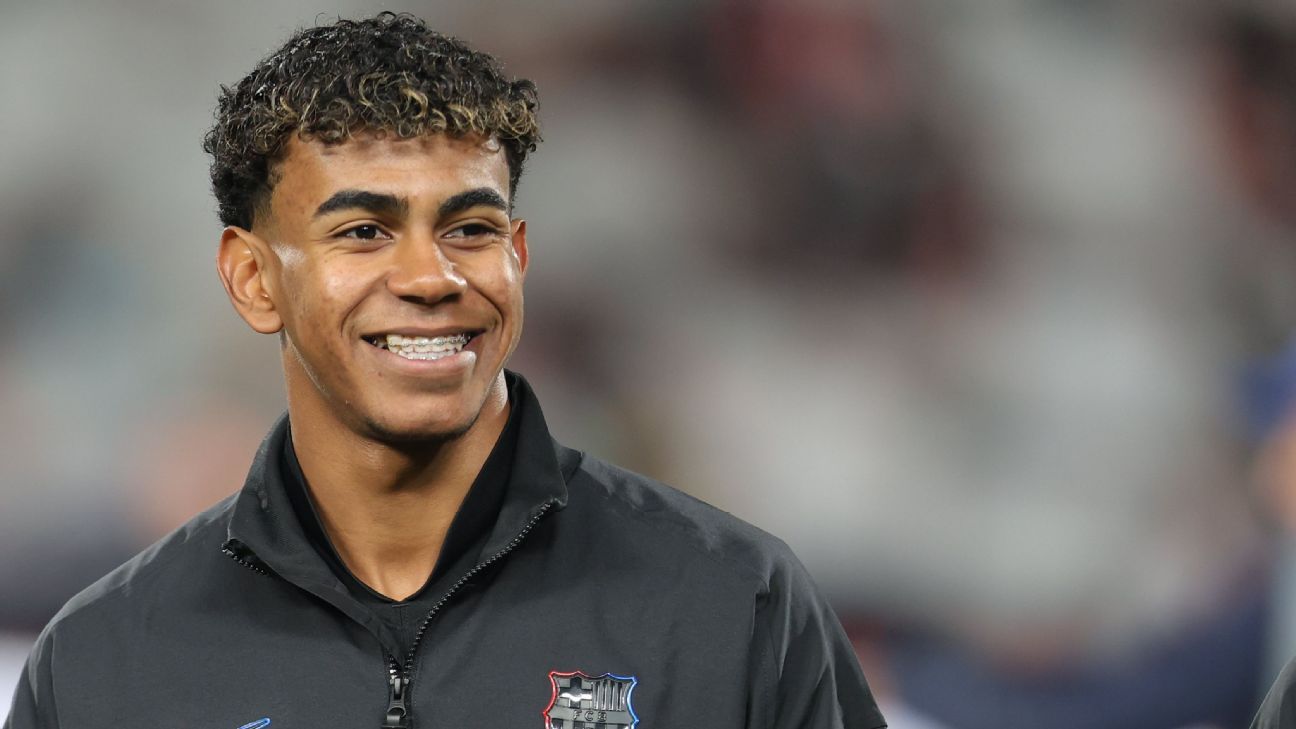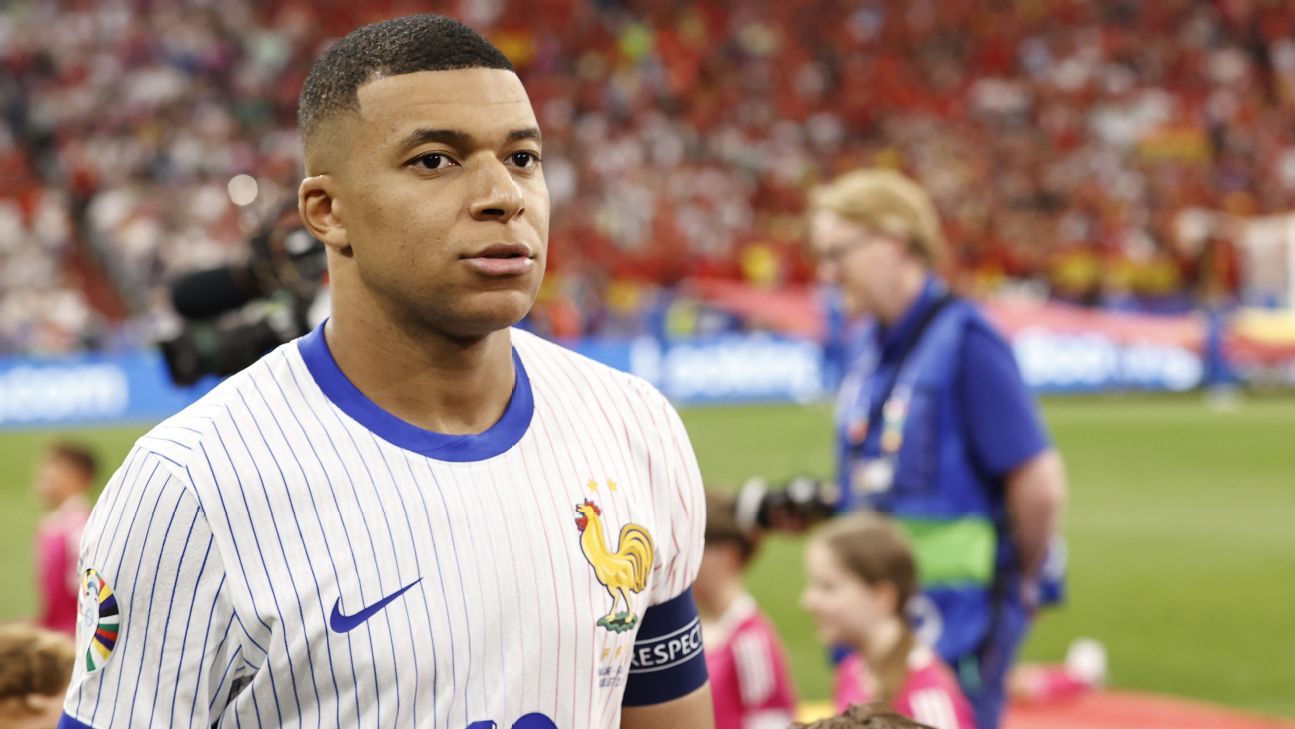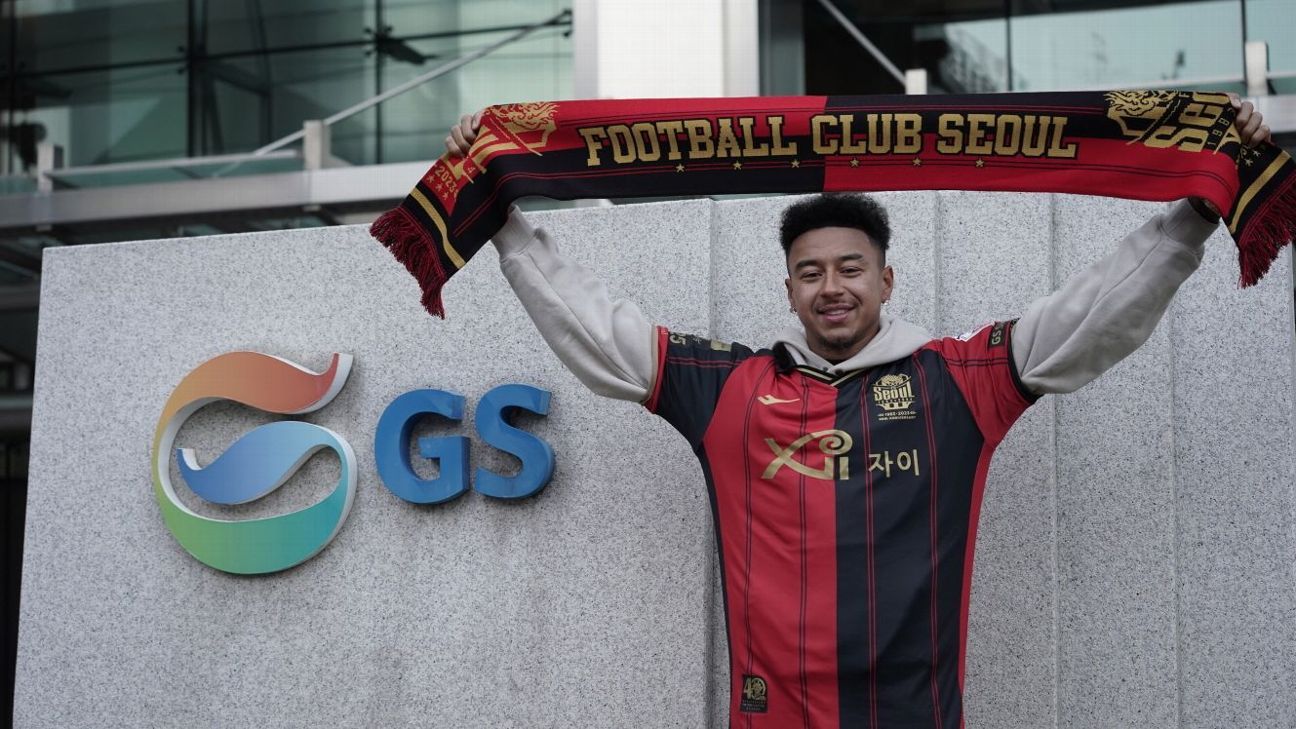Doha, QATAR – It is becoming something of a theme at most high-level international tournaments these days, that men or women, world or continental, the gap between the perceived haves and have-nots, heavy weights and light weights, it is reducing.
As the United States, Canada and Mexico prepare to host an expanded 48-team men's World Cup in 2026, the dreams of some of the lesser-known forces in world soccer are coming to the fore. With Asia effectively doubling its number of representatives in 2026, this month's Asian Cup is proving that the competition for a place at FIFA's premier event is hotter than ever.
– Asian Cup: Home | Support | Groups | team guide
– Stream on ESPN+: LaLiga, Bundesliga, more (US)
Throughout the group stage in Doha, the historic bullies of the Asian Football Confederation (AFC) managed to advance to the knockout stages, but found it much more difficult than in previous years; South Korea's draws with Jordan and Malaysia and Japan's surprise 2-1 loss to Iraq are a case in point.
In the modern era of football, even the so-called minnows have access to training and sports science that allows them to challenge larger football nations physically and with tactics designed to frustrate and contain. But there have also been examples of bravery, of underdogs facing down their opponents and not backing down.
“One thing that has surprised me a little bit has been the physicality of a lot of the nations now, they are some big guys,” Australia coach Graham Arnold said during the group stage. “One of the first things you have to do is win that physical battle.”
The potential of this on a global level is obvious. Since the World Cup expanded to 32 teams in 1998, five nations have had a near-complete monopoly over the four and a half places on offer in Asia. Korea and Japan have qualified for all seven tournaments since France 1998, Saudi Arabia and Iran for five each, while Australia has booked its place in every World Cup since joining the AFC in 2006.
But with eight and a half places available for the 2026 World Cup in North America (eight direct qualification places and one place in an inter-confederation playoff), we are guaranteed to see some new faces among the familiar ones next time. And although other teams could emerge from elsewhere to fight for a place, several nations are giving their best in this Asian Cup and proving that they are strong contenders to make their debut in 2026.
Well, leaving aside the obvious point, yes, Qatar has already been to the last World Cup, even if their three consecutive defeats and hasty exit from the group stage made it a rather ignominious stage. However, their presence in that tournament came by virtue of their status as hosts, and represented the first time they stepped foot on football's biggest stage. When it comes to doing it on the field, Qatar has never qualified for the World Cup since independence in 1971, and came close on a few occasions, such as at France '98, but never managed to book its place. .
That should change in 2026, however, and there's a good chance it would have even without the tournament expanding to 48 entrants. Led by Al Sadd attacker Akram Afif, the Maroons have become one of the strongest teams in Asia in recent years, becoming Asian. champions in 2019 and making a strong effort to retain their crown as tournament hosts this year.
Coach Tintín Márquez's team may not have been at their best up to this point, but they have still advanced to the round of 16 without conceding a single goal in the last fortnight – they topped Group A after defeating China and Tajikistan and then defeat Lebanon 3-0. . And, by the way, Hassan Al-Haydos' goal of defeating China is one of the best he has ever seen.
Hassan Al-Haydos with absolute beauty! 🤩
The Qatar captain comes off the bench to score a belt. 🚀 pic.twitter.com/thtlkhfrwX
— Great goal from CBS Sports ⚽️ (@CBSSportsGolazo) January 22, 2024
They will face Palestine in the round of 16, while Uzbekistan or Thailand await them in the quarterfinals.
Iraq first attended a World Cup in Mexico in 1986, where Raad Hammoudi led the Mesopotamian Lions in matches against Paraguay, Belgium and the host nation, losing 1-0 in the first and last matches and losing 2-1 to the Belgians, Ahmed Radhi scored what, so far, is Iraq's only goal on football's biggest stage. 1986 also marked the World Cup debuts of Canada and Denmark, but while both nations have since returned, the Iraqis have been forced to watch from the sidelines every four years, and the closest they have come to returning, interestingly , It was the last time. The World Cup was held in the United States back in 1994.
Under the guidance of Jesús Casas, Iraq have become one of the stories of the Asian Cup, taking a maximum of nine points from their three group matches, including a 2-1 victory over tournament favorite Japan .
With a team with several players based in Europe and taking advantage of its diaspora to secure the services of players such as former Manchester United player Zidane Iqbal, now at FC Utrecht, it will face Jordan in the round of 16, Tajikistan or the Emirates United Arabs wait after that.
“Football is a fight. You have to be competitive; otherwise, it is impossible to win a game,” said Casas after the victory in Japan. “I choose players who can be fighters, but also good players.
“The difference at this level with the national team is that a balance is needed between fight and quality.”
One of Asia's fastest-growing teams, Uzbekistan's continued investment in its youth national team programs has consistently paid off at youth level in recent years: they defeated England to qualify for the quarter-finals of the U-17 World Cup last year, the Asian U-17 World Cup last year, 20 champions the same year and Asian runners-up at the U-23 level in 2022, and the White Wolves are showing more and more signs that They are ready to translate that into success at senior international level.
– Lynch: Why Uzbekistan could be the rising star at the 2026 World Cup
Despite not having the services of Cagliari attacker (on loan from AS Roma) Eldor Shomurodov and losing the likes of Igor Sergeev and Sherzod Nasrullaev during the tournament itself, the Uzbeks were still able to advance from Group B as runners-up behind from Australia in Doha; It still has players like Lens defender Abdukodir Khusanov and CSKA Moscow midfielder Abbosbek Fayzullaev.
Uzbekistan has never qualified for a World Cup since breaking away from the Soviet Union in 1991; Their closest run ended in a controversial play-off against Bahrain in 2005, when they were eliminated on away goals after the first leg was canceled and replayed following a refereeing error. The White Wolves are currently second in their World Cup qualifying group, comfortably beating Turkmenistan in their first match before returning to Tashkent and staging a second-half comeback to secure a 2-2 draw with Iran. with Sergeev providing the equalizer in the 83rd minute. .
Syria had to deal with some pre-tournament blows when Mohammed Osman, Mardik Mardikian and Mohammad Al Hallak were forced to withdraw from the team due to injuries. However, veteran Argentine coach Héctor Cúper managed to lead the Qasioun Eagles to the round of 16 and only conceded one goal – a draw with Uzbekistan, a narrow 1-0 loss to Australia in which the Socceroos were limited to just a shot on goal and a 1-0 victory over India. As it was the first time that Syria had reached the round of 16 of the Asian Cup, emotions were running high.
🇸🇾 The Syrian translator and interviewer could not hold back his tears after qualifying for the round of 16 of the Asian Cup.
Coach Héctor Cúper was not so excited.pic.twitter.com/isREKgV1pT
— COPA90 (@Copa90) January 23, 2024
The defensive strength of Cúper's unit will be tested on Wednesday when it faces Iran in that knockout clash, as will its ability to maintain it while finding a way to beat Alireza Beiranvand in the Team Melli goal.
First attempting to do so in 1950, Syria has also not had much success globally to this point; They had never been to a World Cup in their history, and came agonizingly close to advancing to a playoff with Honduras for a place at Russia 2018, only to have Omar Al-Somah's last-second free kick denied by the post in a playoff. AFC qualifier against Australia. , a few inches of wood between them advancing towards the away goals and sending them home.
Of course, while there are promising signs for Syrian football, there is still work to be done in the run-up to North America 2026. Syria, situated in Group B of the AFC second qualifying round, got off to a promising start in his campaign by defeating North Korea. Korea won 1-0 in Jeddah to start their campaign, but Japan subsequently handled them well in the next match, losing 5-0 against the Samurai Blue.
North Korea, their main rival to advance to the next phase, defeated Myanmar 6-1 in the other match that day, causing Syria to fall to third place in the group after the first international window on goal difference, making which increased the pressure on them to achieve the pass. a good result when they travel to Yangon in March.
The United Arab Emirates is another nation with just one appearance on football's grandest stage: qualifying for the 1990 edition before falling to Colombia, eventual champions West Germany and Yugoslavia. Ismaïl Mubarak and Thani Jumaa became the first two men to score for the Emiratis in that tournament but, unfortunately for them, they did so against a tide of 11 goals in the opposite direction. They have come close on a few occasions since then, notably losing to Australia in a single-match playoff for the right to face Peru for a place in Qatar in 2022, but so far it has eluded them.
But under the direction of Paulo Bento, who led South Korea to the round of 16 of the 2022 World Cup, Al-Abyad have made a solid start to both their Asian Cup campaign and World Cup qualification. On the road to North America 2026, wins over Nepal and Bahrain put them alone at the top of Group H after two games and, after a win over Hong Kong, a draw with Palestine and a 2-1 loss to Iran on the last day of the World Cup. group stage, they finished second in Group C of the Asian Cup on goal difference.
With a team made up entirely of players plying their trade in the UAE Pro League, they will now face second-placed Tajikistan in their round of 16 match, a competition they are expected to win, before facing either Iraq or Jordan in the quarterfinals. If they advance, a semi-final matchup with a heavyweight in Korea, Saudi Arabia or Australia will most likely await.











